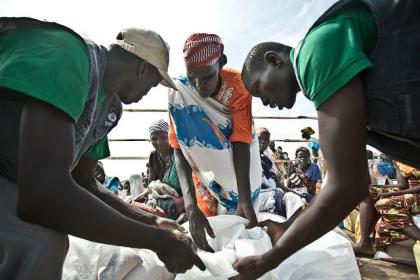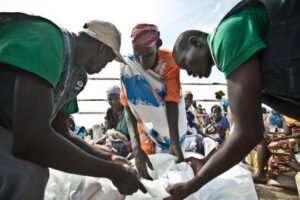Now, More Than Ever U.S. Must Lead
This post by Sam Worthington was originally published at www.interaction.org. Follow @SamInteraction. Today, roughly 20 million people in four different countries face the specter of starvation, including an already declared famine in South Sudan. This disaster puts an all too human face on one of the most morally compelling reasons the U.S. must retain its […]

This post by Sam Worthington was originally published at www.interaction.org. Follow @SamInteraction.

Today, roughly 20 million people in four different countries face the specter of starvation, including an already declared famine in South Sudan. This disaster puts an all too human face on one of the most morally compelling reasons the U.S. must retain its ability to be positively engaged with the rest of the world.
Faced with this reality, it is even more difficult to see the White House’s recently proposed budget cuts (PDF) for both the U.S. Agency for International Development and State Department, wholesale elimination of tailored U.S. development agencies, and a partial withdrawal of funds from international bodies like the UN and World Bank. Such cuts remove vital funding from U.S. efforts to maintain its global leadership and undercut the very agencies able to respond to exactly this type of crisis.
Our nation is stronger when we have robust and well-resourced development and humanitarian agencies. Moreover, foreign aid represents less than 1% of the overall federal budget. In other words, cuts here won’t provide much fiscal saving and will have significant impacts for millions of the world’s most vulnerable families and children at an incredibly precarious time. But these cuts, however, will undermine the diplomatic and development engagement that are a fundamental component of America’s global leadership. Programs to reduce poverty and respond to humanitarian crises are central to American values and in America’s self-interest.
The president’s budget proposal is only the starting point for discussions and negotiations with members of Congress and concerned leaders in private and nonprofit sectors alike. U.S. foreign assistance and its poverty reduction focused accounts have many champions on the Hill. Those champions’ voices will be even stronger when we use our voice to make clear that Americans of all stripes support American leadership through meaningful, life changing work abroad in development and humanitarian contexts. And your voice is needed and essential in the debate to come.
A concerted push will make a difference, creating momentum for policymakers to act in support of foreign aid funding. We encourage you to reach out to your members of Congress whether through writing letters, calling their staff, or even visiting their local and Washington, DC offices. InterAction also will be actively working with its members and partners to coordinate advocacy strategies, provide communications tools, and host digital resources to make their voices heard. If you aren’t sure where to start, ask InterAction to help you plug in.
Together, the supporters of InterAction and its member NGOs constitute a large, powerful, and geographically broad base across the country. We represent the diversity of America that cares about the world’s most vulnerable or marginalized people. We need to make it known that the U.S. must not cede its role as a global leader in development and humanitarian assistance, and that it is in our national interest to stay globally engaged. The lives of many around the world are counting on us and how our country chooses to act.
